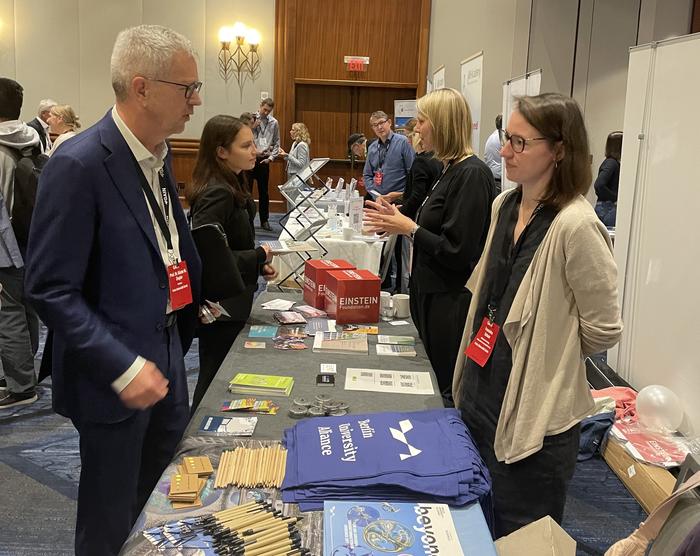Boston, GAIN & Berlin: Why It’s Worth Attending Every Year
Once again this year, Günter M. Ziegler represented the Berlin University Alliance as its spokesperson and President of Freie Universität Berlin at the annual meeting of the German Academic International Network (GAIN) in Boston.
Anyone who has walked through the halls of GAIN in Boston will immediately recognize the atmosphere: a mix between a career fair and the feeling of meeting old friends and colleagues—all united by similar interests and goals. Between panels, the Science Slam, and tightly scheduled one-on-one meetings, something is created within hours that emails alone cannot achieve: trust, focused exchange, and a clear message—“Berlin and Germany welcome everyone!”
GAIN is the largest German-speaking career fair for science in North America, bringing together postdocs and early-career researchers with universities, research organizations, and ministries. It creates networks that open new opportunities.
As spokesperson for the Berlin University Alliance and President of Freie Universität Berlin, I regularly attend with colleagues from Berlin’s university leadership and the Senate Department for Higher Education and Research, Health, and Long-Term Care. We are not there only to “recruit”—we listen: What topics matter to excellent young researchers here? What conditions do they need to take their next career step in Germany—ideally in Berlin?
At the same time, we are deeply engaged in the political discourse. GAIN has sometimes been critically described as a “class trip of German academia.” And that is true—but it is precisely what makes it valuable. The discussions go beyond the situation in the U.S., focusing as well on how to support and defend science in Germany. These conversations took place not only among university leadership and non-university institutions but also in various groups and one-on-one exchanges with State Secretary Rolf-Dieter Jungk from the Ministry of Research and Space, members of the Bundestag’s Science Committee, and the presidents of German Research Foundation (DFG), German Academic Exchange Service (DAAD), and the Humboldt Foundation.
And in between: four ministers, including Berlin’s Senator for Science Ina Czyborra, the chair of the Conference of Science Ministers Bettina Martin, and Falko Mohrs from Lower Saxony—all of them open to listening and engaging in substantive discussions.
This year, my visit was shaped by…
… a joint Berlin presence.
The fact that the BUA universities shared one table and a joint appearance at the fair was a real strength—joined by the Berlin Institute of Health and the Einstein Foundation, and with the University of Potsdam nearby. Only the Federal Institute for Materials Research and Testing, BAM, representing the powerful BR50 non-university research institutes, was a little further away—although it too stands for the integrated Berlin research area.
… matching instead of marketing slogans.
The strongest conversations are those where career paths become concrete: outstanding research topics in Berlin and the people to connect with, transparency in tenure-track, lab facilities and infrastructure for excellent research, dual-career opportunities, visas as well as childcare questions—and very practically: When can I start? What can I apply for? Who supports the transition? That is exactly what GAIN is designed for: dense information, high-quality contacts, and quick follow-up opportunities.
… Berlin as a capital with strength in collaboration.
As the Berlin University Alliance—comprising FU, HU, TU, and Charité—we pool our strengths: from cutting-edge research to clearly structured career paths to direct links with clinical practice. The Alliance, with its five Clusters of Excellence spanning a wide scientific spectrum, from global order (SCRIPTS) to immunology (ImmunoPreCept), is in high demand and underscores how Berlin is evolving into a leading and sustainably growing hub for science and innovation.
… networks that extend beyond the fair itself.
GAIN works because DFG, DAAD, and the Humboldt Foundation join forces—and because the community sustains it: alumni, principal investigators (PIs), deans, and research administration teams. This makes the conversations substantive, solution-oriented, and connects the people who, at different levels, support researchers relocating to Berlin universities and help shape the framework for such a move.
What do we take back to Berlin?
Faster bridges between Boston and Berlin: clear contact points for applications, such as our recently launched Global Scholars’ Gateway (see infobox above), closer collaboration with relevant administrations and ministries, and also necessary mentoring even before returning to the faculties.
Advice for postdocs: Present yourselves! The steps from sending an email to Berlin to being invited for a seminar talk, and from there to applying for a postdoc position, a junior research group, or a tenure-track professorship, are short and fast. Grab the opportunities!
No matter whether your focus is on basic research or translation: Berlin offers a unique density of topics, institutions, and actors that make connecting easy—including non-standard career paths—across universities, BR50 non-university research institutes, start-ups, and healthcare organizations. Get in touch with us—connections across all sectors are open and accessible.
GAIN is not a showcase. It is a working space—and one that inspires confidence to shape the future of research together.

